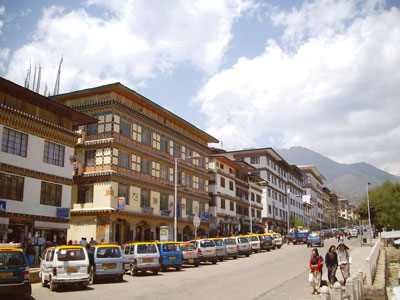 |
A walk around the small city of Thimpu, which has a kilometre-long market, takes one back in time. No brands clamour for your attention, be it aerated drinks, instant noodles or designer wear. The little shops sport homogeneous blue and white signboards for the most part, and do not have much variety on offer. The department store concept is yet to be seen, but this is less to do with a lack of consumer demand than government policy: consumerism is seen to ruin society.
The Bhutanese talk extensively about Gross National Happiness (GNH) as a counter to market and consumption driven GDP. For instance, mountaineering in Bhutan is not allowed, as it has been deemed that the mountains should be kept as they are. Their conception of measuring people's happiness as opposed to consumption or production is unique, and is a counter to western measures of prosperity.
While everyone describes Bhutan as a small country, a population of around 800,000 means the country is manageable. The constitution decrees that 60 per cent forest cover is a must, and this has perhaps saved Bhutan from the kind of 'excavator terrorism' that has plagued Nepal. The rulers of Bhutan have definitely learnt from Nepal's failures, and this can be seen in how they have gone about writing a new constitution, begun their experiments with the ballot box, kept donors in checkl, adopted global calendars and work schedules, and let English co-exist with the national languages.
However, the challenge for Bhutan is to sustain its efforts. While a small population can allow for Singapore-style governance and control, the opening up of information access will be difficult to stem. How long can the local television channel, which resembles the Nepal Television of the early nineties, compete with international channels? How can one ignore the popularity of the first Miss Bhutan contest and the aspirations of Bhutanese youth that make up half the population? How long one can one expect to see this youth in (mandatory) traditional dress, coke in one hand and cell phone in the other? How will the youth challenge those who have been in power for many years in the elections slated for 2013? Does free education and health care mean citizens will take the state for granted, in a country with over 50,000 migrant workers? Will this lead to an Emirates-style economy, where a wealthy state pays for the social security of its citizens while people from different nationalities actually do the work? Only time will tell how these challenges will be addressed.
From an investor's perspective, Bhutan will become a hot destination. If a firm governance structure and access to energy can be seen as two big advantages, the biggest remains Bhutan's parity with the Indian Rupee. This rekindles the Beed's dream of the 'Rupa', a common South Asian currency like the Euro. In the meantime, Bhutan will reap the advantage of India's growth, and no investor can afford to ignore this.
Running on empty
The Buddha's message, Publisher's note
Don't kill the CA, Gagan Thapa
The PLA speaks, Ekal Silwal
War games, Prashant Jha
Flagellating the self-flagellators, Rabi Thapa



